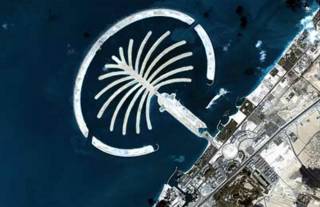Using its short-lived oil wealth, the emirate has built "free zones," areas earmarked for economic liberalization, technological innovation, and political transparency. Among these, three sprawling industrial parks stand out. The first, Internet City, is a bid to make Dubai the Arab world's IT hub. Next is the International Financial Center, a stock market headquarters meant to match Hong Kong's, London's, and New York's, and to trump the region's 13 other exchanges. And there is Media City, home to Al Arabiya, which aspires to replace Cairo as the Middle East's media capital while broadcasting the emirate's vision of openness across the area.Rather than sending young Americans to die in the desert, we should be encouraging natural human ingenuity in the Middle East. Companies that have set up shop in Dubai, including Dell, HP, Microsoft, and Oracle, are engaging in a positive diplomacy of peace by transferring technology and resources to the region.
With its gilded hotels and oil wells, Dubai isn't so much a city as an idea - one that can spread and revive its neighbors, just as Dubai has revived a creed that has long driven Arab history: Not Islam. Commerce.

Employing force and humiliation in our Middle East policies inflames anti-Americanism and does not serve our long term interests in the region. We lose the battle of credibility with Bin Ladenism when moderate Muslims equate America's violent methods with our peaceful traditions of free enterprise and self-reliant local governance.
True liberation in the Middle East requires what Walid Phares and Robert Rabil call a "resistance myth," their term for epic stories that inspire national pride and solidarity, like the Boston Tea Party in America or the Amritsar Massacre in India. These events help a young country solidify around a common identity so that a civil society of trust may develop. New democracies require participation and voice, not statue toppling and looting. The danger in Iraq is that
In the absence of a shared identity of resistance, religious solidarity could easily become the basis for many anti-Western Iraqis to create a new identity based on fighting the coalition. This explains the appeal of Muqtada al-Sadr's movement to radical Iraqi Sunnis and shatters the view that Sunnis will not collaborate with insurgent Shiites, and vice versa. Herein lies the danger for the U.S., especially if hostility against coalition forces becomes synonymous with a rehabilitation of Iraqi pride.I'd rather the Iraqis rehabilitate their pride by beating the pants off slow-moving Western corporations. They too could set up free zones and luscious beach resorts.












